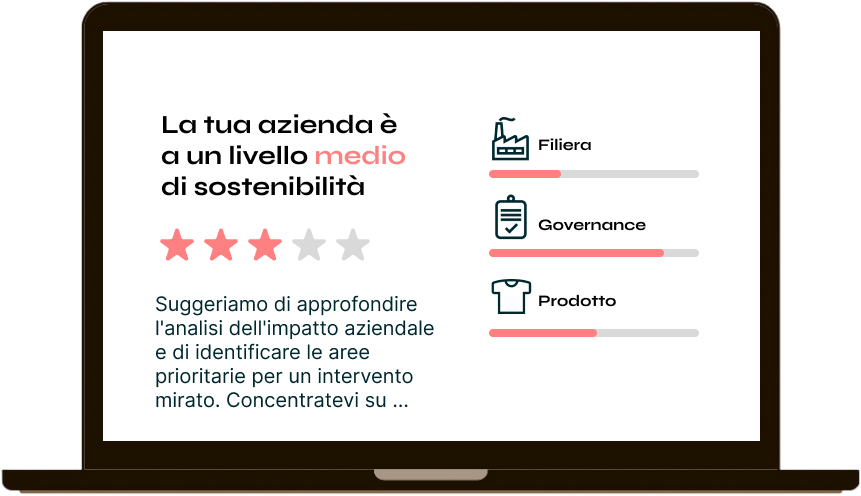Sustainability certifications in the fashion industry
The world of sustainability certifications in the fashion industry is vast, and being able to untangle the vast amount of notions and definitions is not easy for everyone.
This article is aimed at all those companies that are considering adopting one or more sustainability certifications and want clarity on the basic terminology, used in the market, and why it may be relevant to adhere to environmental and/or social standards.
Sustainability certifications: why are they important?
The year 2021 has been a key year for the environment, between G20 and COP26. The world is changing and, with it, the demand: more and more people, particularly young people, are looking for products with low environmental and social impact, preferring to spend more but with awareness of their purchases.
Consumers increasingly need guarantees, and companies must try to adapt accordingly. One way to do this is to acquire certifications: these guarantee the execution of environmental or social performance by the companies that hold them, thanks to the verification of a third party body that certifies that a company or product complies with specific requirements.
Obtaining a certification thus means acquiring its mark and purchase guarantee, benefiting the environment and people, and gaining greater credibility in the eyes of customers.
Types of sustainability certifications in the fashion industry
While product certifications ascertain that the latter meets specific environmental and social requirements and is a form of direct assurance (relating to a specific product), system certifications relate to the organization and its way of managing the environmental burdens arising from its activity and production processes. It is, in this case, a form of indirect assurance.
Major environmental and social sustainability certifications and standards
There are many sustainability certifications adopted in the fashion industry. Below, we will address some of the most relevant ones.
Regarding organic material, Global Organic Textile Standard (GOTS) and Organic Content Standard (OCS) are the main standards that guarantee that textile products (both intermediate and finished) come from organic farming, ensuring traceability throughout the production process.
Global Recycle Standard (GRS) and Recycled Claim Standard (RCS), on the other hand, are the most important voluntary international standards for recycled textiles and are prepared by Textile Exchange. These aim to ensure that finished product materials are actually recycled and processed sustainably, as well as to drive innovation in addressing the "quality" issue of recycled materials.
Among the most important animal welfare certifications are Responsible Down Standard (RDS) and Responsible Wool Standard (RWS), which ensure that textile products come from farms that practice holistic respect for animal welfare. While RWS is specific to wool products, RDS covers the use of feathers or down from water or land birds.
There are a number of companies that certify, on the other hand, social sustainability, paying particular attention to the condition of workers: international standards SA 8000 and Fairtrade, for example, ensure that products have been processed while respecting workers' rights and promoting ethical and fair treatment among workers.
Finally, certifications such as STANDARD 100 by OEKO-TEX® and Bluesign ensure that certified products meet strict limit values for substances harmful to human health.
Benefits achievable through the adoption of sustainability standards and certifications
A company that recognizes the environment as critical to its business and integrates sustainability into its business priorities through the adoption of certifications can enjoy multiple benefits.
First, it gains greater credibility in the eyes of customers. Indeed, through certifications it is possible to demonstrate and prove its commitment to environmental and social issues, improving its brand image.
Moreover, possessing evidence of one's commitment to sustainability will make it easier to access "green" financing, economic incentives and tax breaks.
The importance of having tangible evidence of one's sustainable operations is confirmed by the existence of the European Taxonomy for Sustainable Finance: a classification system that lists environmentally sustainable economic activities and provides an exact definition of what can be considered as such.
The goal of the classification is, in fact, to increase sustainable investments and contribute to the implementation of the European Green Deal, since: it creates security for investors, protects private investors from greenwashing, and helps companies work in a more environmentally friendly way.
The limitations of sustainability certifications
Relying on certifications, unfortunately, is not enough: ongoing commitment is required.
While some certification schemes have high standards, others have bland and unspecific requirements that, if not combined with supply chain traceability systems or additional sustainability measures, can lead to serious shortcomings.
This happens because, in the absence of schemes that include high standards or specific controls, a company's image could improve regardless of its level of sustainability. As a result, consumer demand increases, risking also increasing the environmental damage caused by further increased production.
Conclusion
Certifications are necessary in order to provide assurance to consumers, although they are not an accurate indicator of a company's level of sustainability.
Each certification, in fact, ensures compliance with some of the aspects of corporate sustainability, which, in reality, is influenced by a great many factors.
Cikis can help your company identify and acquire the most suitable sustainability certifications for the business, flanking complementary measures on an ad hoc basis.
In this way, the company will be able to achieve high levels of sustainability, benefit the most from the investment made, and avoid reputational risks.
Get articles like this and the latest updates on sustainable fashion automatically!
